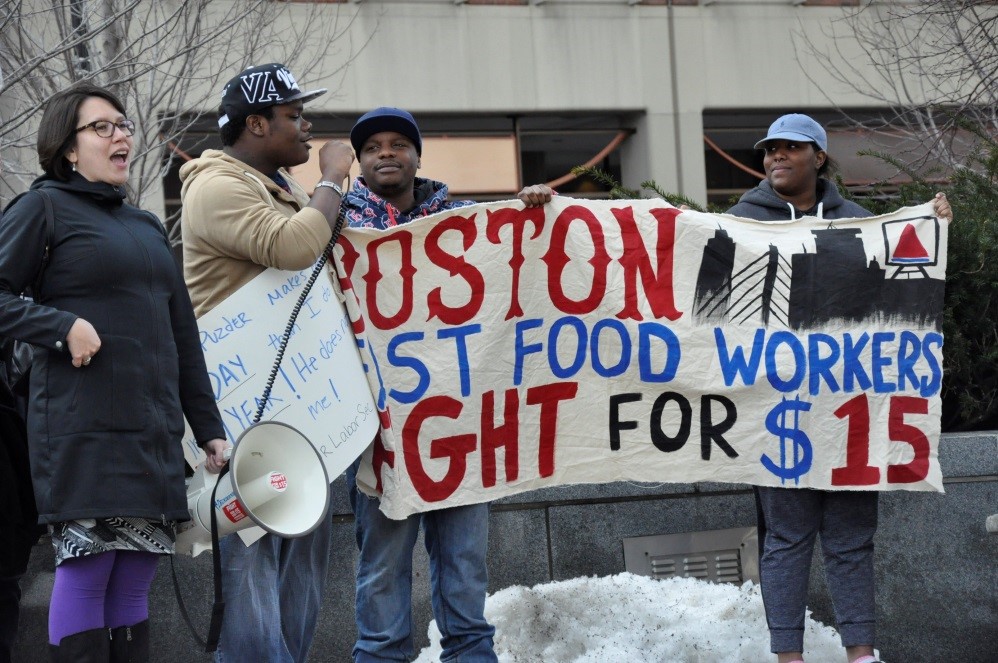The Raise the Wage fight gains momentum
 In early 2017, workers rallied in Boston to oppose the nomination of Andrew Puzder to serve as head of the US Department of Labor. He went on to withdraw his nomination, and since 2012, fast food workers across the US participating in the Fight for $15 have built a robust social movement that has changed the public discourse about the minimum wage. Photo: Mary Babic/Oxfam America
In early 2017, workers rallied in Boston to oppose the nomination of Andrew Puzder to serve as head of the US Department of Labor. He went on to withdraw his nomination, and since 2012, fast food workers across the US participating in the Fight for $15 have built a robust social movement that has changed the public discourse about the minimum wage. Photo: Mary Babic/Oxfam America
Workers in 40 localities across the US saw their minimum wage go up on January 1. Here’s why a federal increase should be next.
Juan Salcedo is celebrating a hard-won victory. After years of standing tall in the Fight for $15, Juan—a crossing guard in the city of Milpitas, California who also works for McDonald’s—is now getting paid just that. More than twice the federal minimum wage of $7.25.
“I wish everyone could know what it’s like to try to survive on the federal minimum,” he says. “You have to pay rent, food, medicine, and costs for children for school—clothes, books. Only those who know what it’s really like can understand living on the edge.”
Salcedo, 63, came to the US from Mexico in the 1970s. He has had a variety of jobs: janitor, meat packer, landscaper, stocking at Safeway, cleaner at McDonald’s. The jobs have differed quite a bit, especially the conditions (he prefers working indoors, as the work is less interrupted by weather, and generally less arduous). What they all have in common? Each one has paid the minimum wage.
Salcedo is one of roughly 58 million people in the US who work in low-wage jobs. And these wages rest on the federal minimum wage, which has been stubbornly stuck for the past 10 years. In that time, the cost of food alone has risen more than 25 percent.
Where Congress won’t, states will
While Congress has failed to raise the minimum wage since 2007, states and localities have made the decidedly common sense move to raise wages locally. More than half the states have minimum wages above the federal level.

And it’s a growing trend: On January 1, 2019, workers in 40 jurisdictions (19 states and 21 cities) across the country saw their minimum wage go up. Eight of these states—Arizona, California, Colorado, Maine, Massachusetts, Missouri, New York, and Washington—began phasing in increases that will eventually reach $12 to $15.
While the absolute increases are not dramatic (30 cents to $1), the cumulative results are impressive: over 4.5 million workers are expected to receive an additional $5 billion in wages in this year alone.
Higher wages benefit everyone
Raising the minimum wages lifts the wage floor for everyone. Immediately, millions of workers earn higher wages and find their way out of poverty. A higher floor also pushes wages for other workers upward, which reduces the inequality gap between bottom and top.
Moreover, this policy solution addresses some deep inequities: women and people of color account for a disproportionate share of low-wage workers in the US. Women of color in particular would see a big boost, as they’re 24 percent of minimum wage workers and 25 percent of tipped workers (compared to 17 percent of all workers).
Add to that evidence that shows local economies benefit from minimum wage increases that hundreds of economists agree have little to no impact on employment rates.
Still, we need a federal solution
Local and state efforts can only go so far—and indeed, millions are still struggling to make it on $7.25. Ultimately, we at Oxfam believe that Congress needs to do its job and increase the federal wage.
Finally, this year, we may see some movement. The Raise the Wage Act of 2019, introduced in the House and the Senate last week, would:
- Raise the federal minimum wage to $8.55 this year and increase it over the next five years until it reaches $15 an hour in 2024;
- After 2024, adjust the minimum wage each year to keep pace with growth in the typical worker’s wages;
- Phase out the outdated subminimum wage for tipped workers, which has been frozen at a meager $2.13 since 1991;
- Sunset the much-criticized ability of employers to pay workers with disabilities a subminimum wage; and,
- Phase out the subminimum wage for workers under the age of 20.
This legislation matters to low-wage workers from all walks of life who do vital, dignified work. They’re caring for children and elderly; cooking and serving food; stocking shelves; cleaning and maintaining schools, hospitals, businesses.
Even today, Juan Salcedo worries about the future. He works hard to keep his diabetes under control, but he worries about an emergency. Still, he’s grateful for the Fight for $15, and for his chance to improve the lives of his colleagues.
Let’s make sure workers like Juan across the country have a better chance to raise a family, save for retirement, and build a good life.
Sign this petition to tell Congress that you support the Raise the Wage Act of 2019!